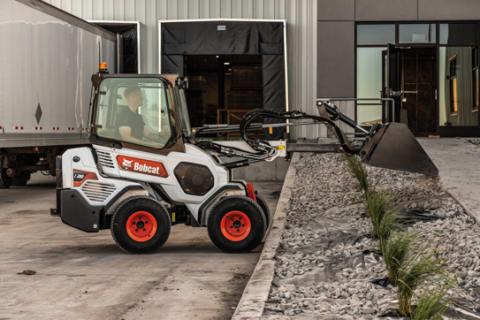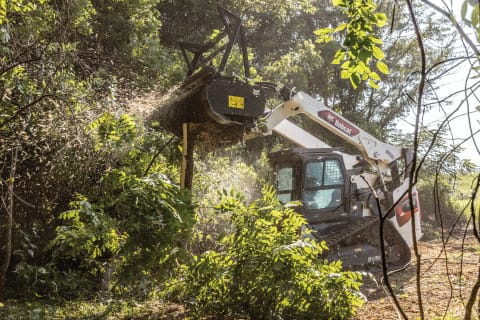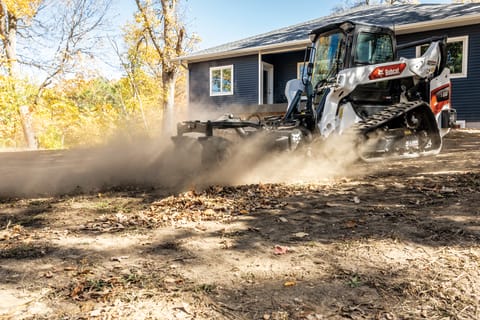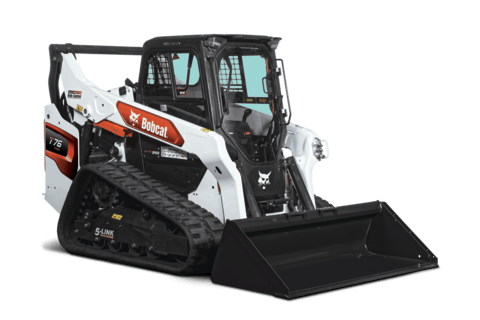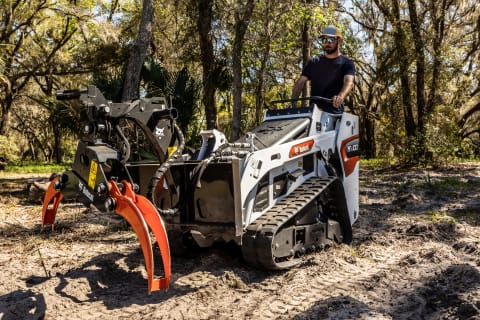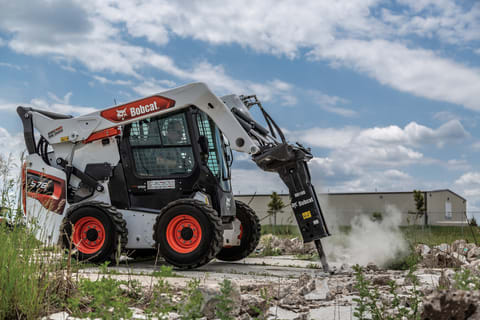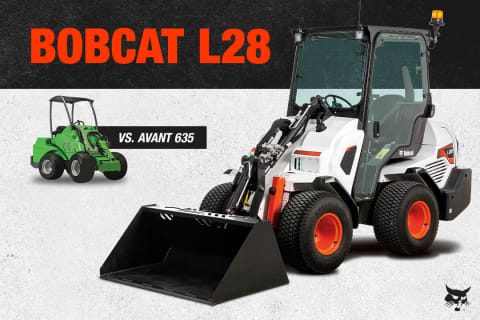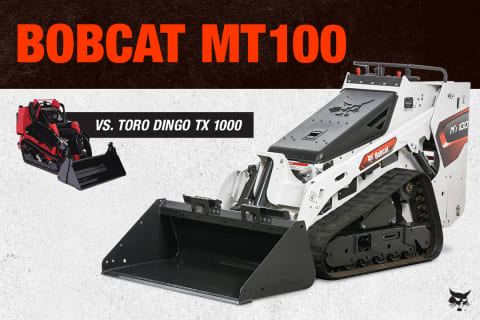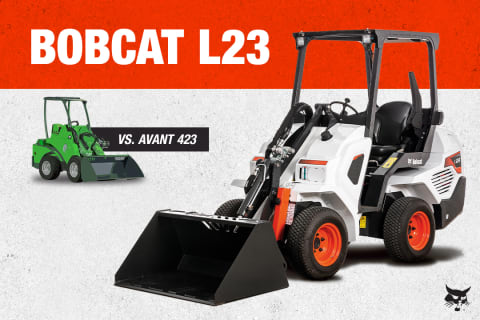- Home
- Buying Resources
- Loaders
- Three Ways to Improve Skid-Steer Loader Productivity
Build Your Loader, Get a Free Price Quote
Customize your loader. Select the model, choose options, and submit to your local dealer for a free price quote.
Build & QuoteThree Ways to Improve Skid-Steer Loader Productivity
Published on August 14, 2015
It’s the busy season and you can’t afford for your skid-steer loader to breakdown. Create and follow a simple maintenance plan to stay ahead of costly repairs and downtime.
Commit to three maintenance habits to significantly extend the life of your skid-steer loader: a routine maintenance schedule, advanced fluids knowledge and seasonal equipment needs.
Routine Maintenance Schedule
If you perform most of your own skid-steer loader maintenance, make time for routine visual inspections of the machine and its components. Inspect these three areas: fluids, filters and grease points.
Fluids
Check fluid levels every day. Most manufacturers’ operation and maintenance manuals and some engine compartment decals provide instruction on daily fluid-level checks for engine oil, hydraulic oil and coolants. Measurable fluid loss may indicate loose hoses, fittings or other potential damage.
Filters
Inspect filters at least once a month. All filters and fluids should be changed at scheduled intervals. Fluids should be monitored to see if they are running at proper temperatures as running them at elevated temperatures may require more frequent replacement. Also note that as oils and coolants age, their additives break down and could impact performance.
Grease Points
Grease equipment parts like pins and bushings at the manufacturer’s specified interval to minimize wear on pivot points.
Get a Free Price Quote From Your Local Dealer
Find A DealerAdvanced Fluids Knowledge
Today’s skid-steer loader engines burn cleaner and run hotter. As the Environmental Protection Agency (EPA) engine emissions standards take effect in the compact equipment industry, you must be more knowledgeable about fuel and oil selection.
Tier 4 engines require ultra-low-sulfur diesel that burns cleaner and helps to reduce engine emissions. CJ-4 oil is required for these engines as it is formulated to reduce ash. Additional filters on storage and transfer tanks will also help ensure that you’re using clean fluids.
Equipment Needs in Different Weather Conditions
Plan to take some special steps in your fluid maintenance plan depending on the time of year. Follow these tips:
- Select engine oil viscosity to match the expected temperature range.
- Frequently monitor coolant levels.
- Keep cooling components like the radiator and oil cooler clean to maximize their efficiency.
Three Time-Saving Maintenance Tips
Making time for daily maintenance is worth every minute and penny you spend on it. Bobcat skid-steer loaders have the industry’s most convenient access to components.
- One-side serviceability: The swing-open tailgate and transversely mounted engine put daily maintenance within easy reach, allowing you to check engine fluids and filters, examine the air cleaner and other components, and inspect the battery.
- Easy tip up cabs: Access hydraulic and hydrostatic components within five minutes by removing two nuts and tipping the cab.
- Oil cooler and radiator: Components are easier to access and clean.
Contact your local dealer for parts support, or to schedule a maintenance check for your machine.
Explore More Loader Resources
View All Articles- Small Articulated Loaders Productivity for Grounds Maintenance
Small Articulated Loaders Productivity for Grounds Maintenance
Learn about how versatile and powerful small articulated loaders increase productivity and their advantages for ground-maintenance and landscaping professions. - How Compact Loaders are Beneficial for Forestry Work
How Compact Loaders are Beneficial for Forestry Work
Learn how Bobcat compact track loaders and skid-steer loaders provide versatility with attachments and machine power to increase your productivity for forestry work. - Landscaping Attachments for Compact Loaders
Landscaping Attachments for Compact Loaders
Explore the top landscaping attachments for your compact loaders, like compact track loaders for versatile productivity and power on the job. - Section 179 Tax Deduction for Compact Equipment
Section 179 Tax Deduction for Compact Equipment
Leverage IRS Section 179 for small business tax benefits to deduct the full purchase (or lease) on qualifying compact equipment during the tax year. Learn more. - Top Attachments for Mini Track Loaders
Top Attachments for Mini Track Loaders
Discover the top attachments from the 24 available for the Bobcat Mini Track Loaders for job-specific landscaping, grounds maintenance and forestry challenges. - Bobcat Attachments for Concrete Work with Compact Loaders
Bobcat Attachments for Concrete Work with Compact Loaders
Learn why Bobcat loaders are the machines of choice for concrete contractors with the productivity increase of Bobcat attachments specifically for concrete work. - How to Choose Compact Track Loader Tracks
How to Choose Compact Track Loader Tracks
The right compact track loader tracks can improve your machine’s performance, minimize ground disturbance and extend your working season in wetter months. - Bobcat L28 vs. Avant 635 Small Articulated Loader
Bobcat L28 vs. Avant 635 Small Articulated Loader
Small articulated loaders provide impressive lifting capabilities. When looking at the Bobcat L28 compared to the Avant 635, here are some factors to consider. - Bobcat MT100 vs. Toro Dingo TX 1000
Bobcat MT100 vs. Toro Dingo TX 1000
When choosing a mini track loader, it is important to examine key features and benefits. Explore how the Bobcat MT100 stacks up against the Toro Dingo TX 1000. - Bobcat L23 vs. Avant 423 Small Articulated Loaders
Bobcat L23 vs. Avant 423 Small Articulated Loaders
When choosing a small articulated loader, it can be overwhelming from the options. Explore this comparison of two popular options: the Bobcat L23 and Avant 423.
